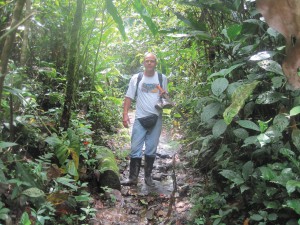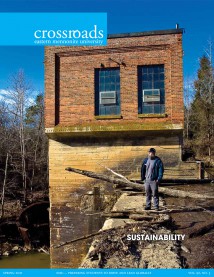Philip (Phil) M. Yoder ’87 owns 220 acres of rainforest in Ecuador, the home country of his biologist-wife, Anita Montufar. After a previous owner logged the land for lumber and to farm, the Yoders have allowed the rainforest to regenerate. Their goal, wrote Phil in an e-mail to Crossroads, is to nurture and preserve their land.

Phil M. Yoder in Ecuador, where he plans to build an "ecolodge"
“I have a goal to build an ecotourism lodge, but I need the community to support and favor this or it will not happen,” Phil wrote. “I am attentively listening to my community to discern my future.” Since allowing the land to return to forest, pasture has been replaced by trees with 40-foot canopies above thick undergrowth, and a colony of Graell’s Tamarins (a species of monkey) has moved in.
Phil said he and Anita are part of a nationwide movement to wean Ecuador from “extractive capitalism,” in which the country’s natural resources are extracted – usually by methods that cause widespread pollution – by large companies such as Chevron, regardless of the impact on the local people and their environment. In recent years, Phil has begun to realize that simply setting aside land will not be enough to preserve the rainforest. Instead, it must sustainably generate some income for the people who live on or around it – hence his interest in ecotourism or in talk about CO2 compensation “at $74 per acre per year” for lands designated as biodiverse forest preserves.
Phil forwarded a Feb. 15, 2011, e-mail in which Nelly Duràn, the minister of tourism of Pastaza province in Ecuador, commended Phil for understanding “the connection between humanity and environment” and for contributing to a management plan aiming at “the protection of the attractive views, spelunking and biodiversity.”
Phil, who also owns an eco-friendly carpentry business called Rainforest Carpentry, has a master of business administration in environmental management from Florida Atlantic University. He and Anita live in Playas, Ecuador, with their two sons, 14-year-old Fred and 11-year-old Sol. For more information about Phil’s ecololodge and ecotourism hopes, e-mail him at rioanzu@gmail.com.
